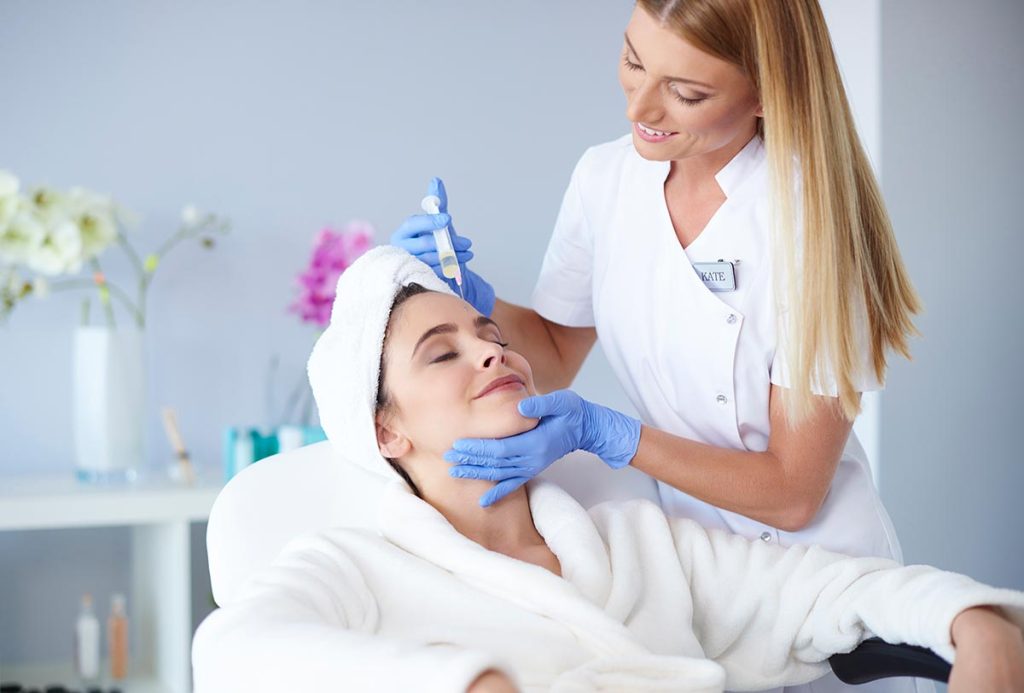Talking to your loved ones about plastic surgery can be delicate and complex, as these conversations touch upon matters of self-image, self-esteem, and the acceptance of oneself. Whether you’re considering undergoing a procedure yourself or you’re concerned about someone you care about who is contemplating plastic surgery, having open and honest discussions is essential in order to foster understanding and empathy.
At North Raleigh Plastic Surgery, our board-certified plastic surgeon, Dr. Ortiz, has seen firsthand how the support and understanding of loved ones enhance the experience of getting a cosmetic procedure. Whether you need support on the day of your surgery or you have someone at home who can assist you with aftercare, choosing people in your life who you trust to share your plastic surgery goals with can help make your plastic surgery journey a positive event.
Who Should I Tell About My Upcoming Plastic Surgery Procedure?
Deciding who to inform about your upcoming plastic surgery procedure is a personal choice, and it ultimately depends on your comfort level and the dynamics of your relationship. It’s usually a good idea to inform your immediate family members, such as your spouse, parents, children, or siblings, as well as your closest friends.
Consider talking to your loved ones about plastic surgery by selecting a few individuals whom you trust implicitly. These might be friends or family members who have consistently shown support and understanding in the past. Having someone who is aware of your decision can provide you with a sense of emotional support and someone to confide in throughout the process.
It’s important to remember, however, that it is entirely up to you to decide who to disclose your upcoming plastic surgery procedure to. While it can be beneficial to have a support system in place, it’s important to prioritize your own comfort and well-being. Take the time to reflect on your relationships and consider the individuals who are most likely to be understanding, supportive, and respectful of your decision.
How to Talk to My Family and Friends About My Plastic Surgery
Making the decision to undergo plastic surgery is a personal, and often transformative, journey. Whether you’re seeking cosmetic enhancements such as rhinoplasty, a tummy tuck, liposuction, a face lift, or reconstructive procedures for a congenital anomaly, like a cleft palate, other physical malformation, or a scar revision, discussing your plans with family and friends can be both empowering and challenging.
Talking to your loved ones about plastic surgery requires effective communication, understanding, and managing potential reactions– while some loved ones will react with support, others might react with judgment, and others may showcase jealousy or admiration.
Understanding how to approach your conversations with your loved ones about your plastic surgery can help ease your anxieties while having the added benefit of securing support from people who will be able to help you throughout your recovery process.
Be Open and Honest
When talking to your loved ones about plastic surgery, honesty is key. By approaching the conversation with sincerity and openness, you establish a foundation of trust. Share your motivations, goals, and expectations behind the procedure. Be honest about any concerns or fears you may have, as well as the research you’ve conducted, and consultations you’ve had with medical professionals. Emphasize that your decision stems from personal desires for self-improvement and self-confidence, rather than external pressure or insecurity.
Know What Details to Share
While honesty is crucial, it’s also important to consider what level of detail you’re comfortable sharing when talking to your loved ones about plastic surgery. Understand that not everyone will have the same level of understanding or interest in the technical aspects of your procedure. Tailor the information you provide to match the individual’s level of curiosity and ability to comprehend medical terminology. Focus on the outcomes and benefits you expect rather than overwhelming them with technical jargon.
Be Prepared for the Risk of Judgment
Talking to your loved ones about plastic surgery may elicit a range of reactions, including judgment. Some individuals might hold misconceptions or biases about cosmetic procedures. The reactions you can expect may depend on the plastic surgery procedure you are getting.
For instance, discussing plans for a breast augmentation with implants so you feel more confident in the appearance of your body, versus discussing plans to get a breast reduction to eliminate back pain, may garner differing reactions based on the social stigmas people hold.
It’s important to mentally prepare yourself for the possibility of negative responses and remember that their opinions are shaped by their own perspectives and experiences. Stay calm and confident in your decision, understanding that you are the best judge of what is right for you and that you alone can make decisions regarding your own body.
Remain Confident and Calm
Confidence is key when talking to your loved ones about plastic surgery. Projecting confidence in your decision will help alleviate concerns from your loved ones. Reiterate that you have carefully considered your options, researched the procedure, and consulted with qualified medical professionals. Speak assertively about your motivations and the positive impact you anticipate the surgery will have on your self-esteem and overall well-being. By remaining calm and collected, you can set the tone for a more productive conversation.
Explain What You Need from Them
Clearly expressing your expectations and needs from your family and friends is important for establishing a support network. Let them know how they can be there for you during the preparation, procedure, and recovery stages. Whether you require emotional support, assistance with practical matters, or simply someone to listen, communicate your needs openly and honestly. This will help your loved ones understand their role and allow them to provide the support you require.
Ways Your Loved Ones Can Provide Support for Your Plastic Surgery
When undergoing plastic surgery, having the support of your loved ones can make a significant difference in your overall experience and recovery. Let’s look closer at some ways your family and friends can provide support during your plastic surgery journey.
Emotional Support
Going through any surgical procedure can bring up a range of emotions, including excitement, nervousness, and anxiety. Your loved ones can offer emotional support by being there to listen, validate your feelings, and provide encouragement throughout the process. Having someone to talk to and lean on can help alleviate any pre-surgery jitters and post-surgery emotional ups and downs.
Accompanying You to Appointments
Depending on the nature of your surgery, you may have pre-operative consultations, follow-up visits, and post-surgery check-ups with your surgeon. Having a family member or friend accompany you to these appointments can provide a sense of comfort and an extra set of ears to help you remember important details and ask questions. Additionally, having a loved one you can rely on for the day of surgery to drive you to and from your appointment can alleviate stress on the day of your procedure.
Assisting with Medication Management
Following your surgery, you may be prescribed medications to manage pain, reduce swelling, or prevent infection. Your loved ones can help by organizing and reminding you to take your medications as prescribed. They can also assist in tracking your medication schedule and ensuring you have an adequate supply of any necessary prescriptions.
Wound Care
Depending on the type of plastic surgery you undergo, you may have incisions or wounds that require proper care. Your loved ones can assist you in cleaning and dressing the wounds according to your surgeon’s instructions. This may involve helping you change bandages, applying ointments, or gently cleansing the area to promote healing and reduce the risk of infection.
Providing Physical Support
Plastic surgery recovery often involves restrictions on certain activities or limitations in movement. Your loved ones can lend a hand by helping you with tasks that may be challenging during this time, such as getting in and out of bed, assisting with bathing or showering, and helping you dress. They can also provide support when walking or moving around to ensure your safety and comfort.
Assistance with Practical Matters
Plastic surgery procedures often involve some level of physical recovery and temporary limitations. Your loved ones can lend a helping hand by assisting with daily activities, such as meal preparation, household chores, or running errands, especially during the initial stages of your recovery when you may have limited mobility or require additional rest. Their practical support can ease your stress and allow you to focus on your healing process.
Providing a Safe Space
Plastic surgery can involve changes in your appearance, and it’s important to have a safe and non-judgmental space to express your feelings and concerns about the process. Your loved ones can create an environment where you feel comfortable discussing any insecurities or adjustments you may be experiencing. They can offer reassurance and remind you of your decision to undergo the procedure based on your personal goals and aspirations.
Celebrating Your Progress
As you recover and start seeing the results of your plastic surgery, your loved ones can play a vital role in celebrating your progress and boosting your self-esteem. Their positive reinforcement and compliments can go a long way in reinforcing your decision and enhancing your confidence. Encourage them to focus on the positive changes and the increased sense of well-being you are experiencing.
Contact Our Talented and Experienced Raleigh Plastic Surgeon Today
If you’re considering plastic surgery to enhance your appearance, boost your confidence, or address specific concerns, it’s crucial to consult with a skilled and experienced Raleigh plastic surgeon.
With years of experience in the field, Dr. Ortiz has honed his expertise in a wide range of cosmetic procedures, ensuring exceptional results tailored to your unique needs. From facial rejuvenation like Renuvion skin tightening to body contouring after weight loss, our surgeon offers a comprehensive range of options for facial procedures, body procedures, breast procedures, and male plastic surgery procedures to improve self-esteem and restore confidence in yourself.
Together, we will embark on a journey towards a more confident, vibrant, and beautiful you.
Call 919-532-2270 or fill out our contact form below to book your initial consultation today.







